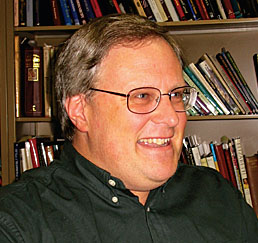
[caption id="Hindsight_img1" align="aligncenter" width="258"]

NOT ALL FICTION IS EQUALLY FALSE. In fact, many tall tales are woven with the intent not of deceiving, but of illuminating. From Jesus’parables to Aesop’s fables, many a yarn has helped adults and children alike see the world in a more meaningful way. Of course, there is also another class of fiction, epitomized by Kipling’s “Just So” stories, which are neither particularly illuminating nor deliberately deceitful, but, well, just so.
In this issue we have two stories that bring us face to face with both sorts of fiction. Each involves a tale of a king and is, in the strictest sense, untrue.
Actor Dominic Monaghan introduces one of these tales of kingship in his reflections on his role in The Return of the King, the film based on the imaginative book by J .R.R. T olkien. In the foreword to an early edition of Tolkien’s Lord of the Rings trilogy, he wrote: “As for any inner meaning or ‘message,’ it has in the intention of the author none …. to please readers was my main object.” If we take Tolkien at his word, his portrait of the fictional King Aragorn is true only in the sense that it accurately reflects the author’s own notions of the qualities of a good and heroic king.
The distracted King famously let the loaves burn .…
Our second tale of kingship is that of Alfred the Great. Notably, Jim Hargan’s feature makes no mention of this undeniably historical King’s most famous adventure, and for good reason: it never happened.
The apocryphal story tells how the King, while travelling incognito through the countryside, stayed at the cottage of a peasant woman who asked him to tend the loaves of bread she was baking. The distracted King famously let the loaves burn, and suffered the woman’s rebukes until her husband recognized the King and shushed his wife. Alfred, displaying admirable humility, acknowledged his fault rather than demanding the homage due to him as King.
To the sober historian, the tale of King Alfred and the Cakes is no truer than the story of King Aragorn. But in a sense that Tolkien would immediately acknowledge, it has validity. Just as Aragorn reflects Tolkien’s vision of the ideal king, the Alfred and the Cakes story, most likely conjured up by the author of the 10th-century Life of St. Neot, is an expression of the character of the real-life King. Or, as one commentator has put it, Alfred never really burned a peasant’s cakes, but who are we to say that if he had, he would not have behaved in the way the story depicts?
So in this sense at least, both of these stories tell us something very factual about Britons’ideals of kingship held over the centuries. And, interestingly, both the originator of the burned cakes myth and Tolkien, who wrote a millennium later, agreed that humility, of all things, stands among the most important characteristics of an ideal king.
Hmmm … I wonder; would Henry VIII have agreed?
[caption id="Hindsight_img2" align="aligncenter" width="142"]





Comments